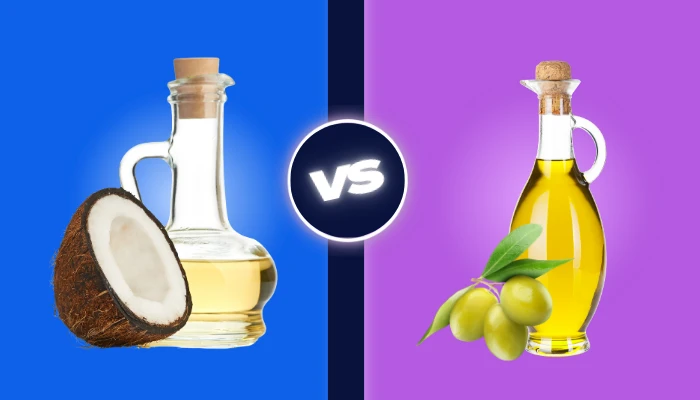Choosing the right cooking oil can feel like navigating a minefield of conflicting advice. Two of the top contenders—coconut oil and olive oil—are both touted for their health benefits, but which one truly reigns supreme?
Let’s cut through the noise and dig into the heart-healthy, brain-boosting, and culinary marvels of these oils.
The Basics: What Are We Dealing With?
Coconut Oil
Extracted from the meat of mature coconuts, coconut oil is a tropical delight. It’s available in two forms: virgin (unrefined) and refined.
Virgin coconut oil is cold-pressed, preserving its natural flavor, aroma, and beneficial compounds. Refined coconut oil undergoes more processing, making it more heat-stable but less nutritious.
Olive Oil
Made from pressing whole olives, olive oil is a staple of the Mediterranean diet. Like coconut oil, it comes in virgin (or extra virgin) and refined forms.
Extra virgin olive oil is cold-pressed and retains most of the olives’ flavor and health-promoting polyphenols. Refined olive oil is processed to withstand higher cooking temperatures but loses some of its nutritional value.
Health Benefits: What’s in It for You?
Coconut Oil
- Heart Health: Contrary to old myths, coconut oil isn’t the enemy. It’s rich in lauric acid, which can boost HDL (good) cholesterol and possibly improve overall heart health.
- Brain Health: The medium-chain triglycerides (MCTs) in coconut oil are easily digested and converted into ketones, providing an efficient energy source for the brain.
- Immune Support: Lauric acid also boasts antimicrobial properties, helping to fend off harmful microorganisms.
Olive Oil
- Cardiovascular Champion: Olive oil is loaded with monounsaturated fats, particularly oleic acid, which helps reduce LDL (bad) cholesterol and the risk of heart disease.
- Anti-Inflammatory: The polyphenols in olive oil, especially oleocanthal, act like natural anti-inflammatories, reducing chronic inflammation and possibly mimicking the effects of ibuprofen.
- Antioxidant Powerhouse: Packed with antioxidants, olive oil protects your cells from oxidative stress, potentially lowering the risk of cancer and slowing aging.
Cooking Capabilities: What’s on the Menu?
Coconut Oil
- High Heat Hero: With a higher smoke point, coconut oil is perfect for frying, roasting, and baking. Its neutral flavor also makes it versatile for both sweet and savory dishes.
- Saturated Fat Content: High in saturated fats, coconut oil is excellent for keto baking, providing structure and a rich texture to dishes.
Olive Oil
- Salad Star: Olive oil’s distinct, fruity flavor shines in salad dressings, dips, and light sautéing.
- Lower Smoke Point: Though not as heat-resistant as coconut oil, extra virgin olive oil can still handle moderate heat, making it ideal for sautéing and baking at lower temperatures.
Comparing Nutritional Profiles
Coconut Oil
- Types of Fat: Primarily saturated fats, including medium-chain triglycerides (MCTs) and lauric acid.
- Calories and Fat Content: One tablespoon of coconut oil contains about 117 calories and 13.6 grams of fat.
- Health Claims: Supports brain health, boosts immunity, and provides quick energy due to MCTs.
Olive Oil
- Types of Fat: Rich in monounsaturated fatty acids (MUFAs), particularly oleic acid, with some polyunsaturated fats.
- Calories and Fat Content: One tablespoon of olive oil contains about 119 calories and 13.5 grams of fat.
- Health Claims: Reduces the risk of cardiovascular disease, lowers LDL cholesterol, and has anti-inflammatory properties.
The Verdict: Which One Wins?
Health Impact: Both oils have unique benefits. Olive oil’s extensive research-backed health benefits, particularly for heart health, make it a clear favorite for those looking to reduce the risk of chronic diseases. Coconut oil, with its emerging benefits in brain health and immunity, holds its own but lacks the extensive scientific backing of olive oil.
Culinary Use: For high-heat cooking, coconut oil is the go-to. Its ability to withstand high temperatures without breaking down makes it ideal for frying and roasting. Olive oil, with its rich flavor, is unbeatable in raw applications like salad dressings and dips.
Key Takeaways
- Incorporate Both: Using both oils in your kitchen can offer a range of health benefits. Virgin coconut oil for high-heat cooking and extra virgin olive oil for salads and moderate-heat cooking.
- Quality Matters: Choose unrefined or virgin versions of both oils to maximize health benefits.
- Moderation is Key: Despite their benefits, both oils should be consumed in moderation as part of a balanced diet.
By understanding the strengths and optimal uses of coconut and olive oil, you can make informed choices that enhance both your health and your culinary creations. Remember, the best oil for you depends on your specific health goals and cooking needs. So, stock up your pantry with both and enjoy the best of both worlds!
Nutrition Comparison Table
| Category | Coconut Oil | Olive Oil |
|---|---|---|
| Overview | ||
| What it is | Edible oil extracted from coconut meat; solid below ~76°F, liquid when warm. | Oil pressed from olives; liquid at room temperature; valued for flavor and health profile. |
| Primary macronutrient | 100% fat (high in saturated fat) | 100% fat (rich in monounsaturated fat) |
| Typical uses | Baking, frying (stable at medium heat), smoothies, dairy substitute, cosmetics. | Cooking, sautéing, dressings, marinades, dips, frying (extra light), skincare. |
| Nutrition (per 1 Tbsp / 14 g) | ||
| Calories | ~120 kcal | ~120 kcal |
| Fat profile | ~12 g saturated fat; ~1 g MUFA; ~0.2 g PUFA. | ~10 g MUFA (oleic acid); ~1.5 g saturated; ~1 g PUFA. |
| Carbohydrate / Protein | 0 g / 0 g | 0 g / 0 g |
| Micronutrients | Trace vitamin E; negligible minerals. | Vitamin E (~10% DV); vitamin K (~10% DV). |
| Culinary Performance & Uses | ||
| Flavor | Mild coconut flavor (virgin); refined is neutral. | Distinct fruity, peppery flavor (extra virgin); refined is milder. |
| Smoke point | ~350°F virgin; ~400°F refined. | ~375°F extra virgin; ~465°F refined/light. |
| Best uses | Baking, medium-heat cooking, vegan butter replacement, desserts. | Dressings, sautéing, roasting, grilling, frying (light/refined), dips. |
| Health Context | ||
| Heart health | High in saturated fat; raises LDL and HDL; debate about net effect on cardiovascular health. | Strong evidence supports benefits; lowers LDL, improves HDL, anti-inflammatory compounds. |
| Bioactive compounds | Lauric acid (antimicrobial properties); lacks significant polyphenols. | Rich in polyphenols, antioxidants, oleocanthal (anti-inflammatory). |
| Diet fit | Popular in paleo, keto, vegan baking. | Cornerstone of Mediterranean diet; recommended for general health. |
| Environmental Considerations | ||
| Cultivation | Primarily tropical regions (Philippines, Indonesia, India); biodiversity concerns (monocropping). | Mediterranean regions; traditional groves can support biodiversity; modern intensive farming may strain water. |
| Processing | Cold-pressed (virgin) or refined via heat/solvents. | Cold-pressed for extra virgin; refined oils use heat/filtration. |
| Shipping footprint | Long-distance export to Western markets increases transport emissions. | Shipped globally but closer to European and US markets; lower shipping distances vs coconut. |
| Storage, Shelf Life & Safety | ||
| Shelf life | ~2 years unopened; stable due to saturation. | 12–18 months unopened; shorter if exposed to heat/light. |
| Storage tips | Cool, dry place; solidifies in cooler temps. | Store in dark glass bottle, cool place; avoid heat and light. |
| Buying, Label Reading & Kitchen Fit | ||
| Label cues | Virgin/extra virgin = cold-pressed; refined = neutral flavor. | Extra virgin = unrefined, highest quality; “light” = refined, milder flavor. |
| Cost | Moderate; virgin more expensive than refined. | Ranges widely; extra virgin premium, refined affordable. |
| Substitutions & Swaps | ||
| If you don’t have it… | Use butter, ghee, or other neutral oils in baking/cooking. | Use avocado oil, canola, sunflower, or other neutral oils depending on recipe. |
| Quick Takeaways | ||
| Bottom line | Stable cooking oil with unique flavor; high saturated fat means use moderately. | Well-researched health benefits; versatile in cooking; cornerstone of healthy diets. |
10 Most Frequently Asked Questions
- Which oil is better for weight loss?
Both coconut oil and olive oil can be part of a weight loss diet, but they work differently. Coconut oil contains medium-chain triglycerides (MCTs), which may boost metabolism and support fat loss. Olive oil, rich in monounsaturated fats, can help maintain a healthy fat intake, which is crucial for weight management. Including both oils in moderation can be beneficial.
- Can you use coconut oil at room temperature?
Yes, coconut oil can be used at room temperature. It remains solid at cooler temperatures but melts at around 76°F (24°C). This makes it versatile for various culinary uses, from baking to frying. Its high saturated fat content helps it maintain stability at room temperature.
- Is extra-virgin olive oil healthier than coconut oil?
Extra-virgin olive oil is inarguably the healthiest oil thanks to its high content of monounsaturated fats, polyphenols, and vitamin E. It supports heart health and has strong anti-inflammatory properties.
Coconut oil, while beneficial, is higher in saturated fats and should be consumed in moderation. Both oils have their own health benefits, so the best choice depends on individual health goals. That said, you can’t go wrong with olive oil!
- How do unrefined oils compare to refined oils?
Unrefined oils, such as extra-virgin olive oil and virgin coconut oil, retain more of their natural flavors and nutrients. They undergo minimal processing and don’t involve chemical solvents. Refined oils, while more stable at high temperatures, lose some beneficial compounds during processing. Choosing unrefined oils is generally the healthier option for most culinary uses.
- What type of oil should I use for high-heat cooking?
For high-heat cooking, such as frying, coconut oil with its high smoke point (350°F or 177°C) is a suitable option. Olive oil, especially extra-virgin, has a higher smoke point (410°F or 210°C) and can also be used for sautéing and light frying. Avoid using unrefined oils for deep-frying, as they can degrade at high temperatures.
- How does fat intake affect cholesterol levels?
Fat intake significantly impacts cholesterol levels. Saturated fats, found in higher amounts in coconut oil, can raise LDL (bad) cholesterol levels. Monounsaturated fats, predominant in olive oil, help reduce LDL cholesterol while increasing HDL (good) cholesterol levels. Balancing fat types is key to maintaining healthy cholesterol levels.
- What are the potential health benefits of using coconut oil and olive oil?
Coconut oil offers antimicrobial properties, supports brain health due to its MCT content, and can boost energy levels.
Olive oil, rich in monounsaturated fatty acids and antioxidants, is linked to reduced risk of cardiovascular disease, lower inflammation, and protection against oxidative damage.
Both oils provide unique health benefits and can be part of a healthy diet.
- Are there any chemical changes to be aware of when cooking with these oils?
When oils are heated past their smoke point, they can undergo chemical changes, producing harmful compounds. Coconut oil’s higher smoke point makes it stable for higher heat cooking, whereas extra-virgin olive oil should be used at lower to moderate temperatures to preserve its beneficial properties. You heat olive oil up too much, and you kill all of its nutritional value.
- What is the main benefit of each oil?
The main benefit of coconut oil lies in its MCT content, which supports metabolism and brain health. Olive oil’s primary advantage is its monounsaturated fat content, which promotes heart health and reduces inflammation. Both oils contribute to a healthy diet when used appropriately.
- How do these oils compare in terms of calories and fat content?
Both oils are calorically dense, with around 117–119 calories per tablespoon. And they both contain approximately 13.5-13.6 grams of total fat. But, and this is where it matters most, the type of fat is different.
Coconut oil is higher in saturated fats, while olive oil is rich in monounsaturated fats. If your current diet is already relatively high in saturated fats, you’ll want to limit coconut oil. Olive oil, on the other hand, is safe and healthy for everyone.


















